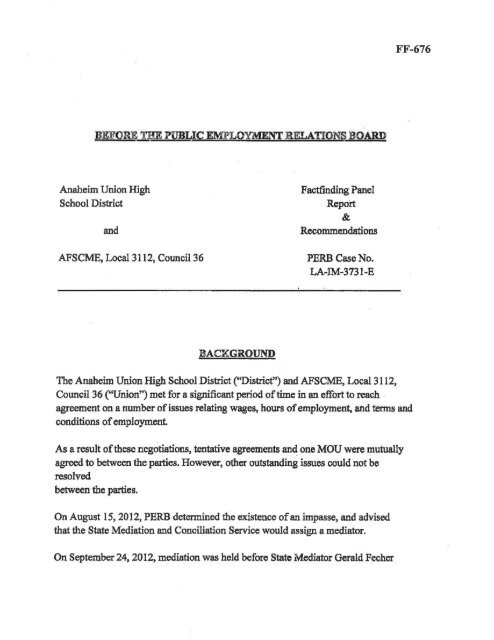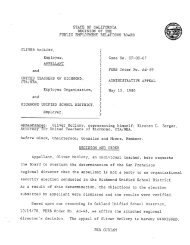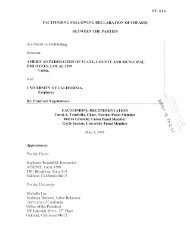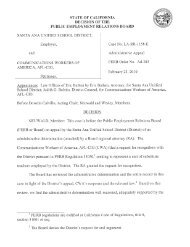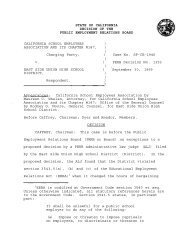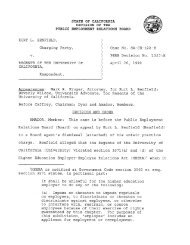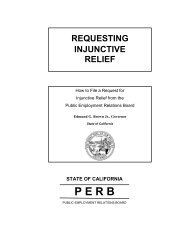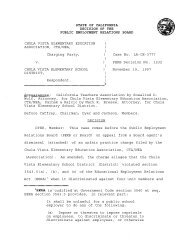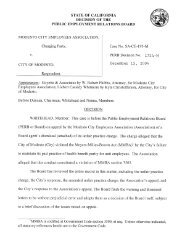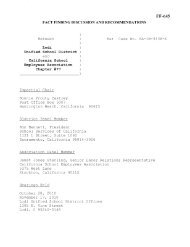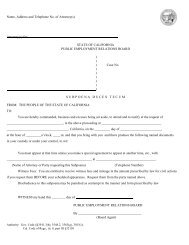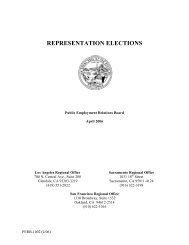FF-676 - Public Employment Relations Board
FF-676 - Public Employment Relations Board
FF-676 - Public Employment Relations Board
You also want an ePaper? Increase the reach of your titles
YUMPU automatically turns print PDFs into web optimized ePapers that Google loves.
<strong>FF</strong>-<strong>676</strong><br />
BEFORE...!.BE PUBLIC El\tIJ.>J.,,OY1'1EN'f P..ELATIONS BOARD<br />
Anaheim Union High<br />
School District<br />
and<br />
AFSCME, Local 311-2, Council 36<br />
Factfmding Panel<br />
Report<br />
&<br />
Recommendations<br />
PERB Case No.<br />
LA-IM-3731-E<br />
BACTLGROUND<br />
The Anaheim Union High School District ("District'') and AFSCME, Local 3112,<br />
Council 36 ("Union") met for a significant period of time in an effort to reach .<br />
agreement on a number of issues relating wages, hours of employment, and terms and<br />
conditions of employment.<br />
As a result of these negotiations, tentative agreements and one MOU were mutually<br />
agreed to between the parties. However, other outstanding issues could not be<br />
resolved<br />
between the parties.<br />
On August 15, 2012 7 PERB determined tlie existence of an impasse, and advised<br />
that the State Mediation and Conciliation Service would assign a mediator.<br />
On September 24, 2012, mediation was held before State I\.fediator Gerald Fecher
from the State Mediation and Conciliation Service.<br />
On September 26, 2012, Mr. Fecher in a letter to PERB certified the parties to<br />
factfinding.<br />
On September 26, 2012, the District, in a letter from legal counsel Spencer E.<br />
Covert, requested P~RB to appoint the chair of the Factfinding Panel. Mr~ Ron<br />
Bennett was named as the District's representative to the Factfinding Panel and<br />
iv.fr. Pete Schnaufer, the Union's ChiefNegotiator, named Marcos E. Cardenas as the<br />
Union's representative.<br />
On October 16, 2012, PERB notified the parties tha~ Mr. Wllliam W. Floyd was<br />
appointed the Chair of the Factfinding Panel.<br />
On October 25 and 29, 2012, the three-member Factfinding Panel met and received<br />
the presentations, arguments, and evidence, both oral and documentary, from the<br />
parties. The wi1nesses called by the parties presented testimony under oath to the<br />
Factfinding Panel. The Factfinding Panel also explored the possibility of reaching<br />
tentative agreement, but the parties were unable to do so. The factfinding hearing was<br />
submitted to the Factfinding Panel on October 29, 2012 at approximately 7:00 p.m.<br />
for the Factfinding Panel's findings and recommendations.<br />
The parties were advised that they could submit briefs to the Chair by 5 :00 p.m. on<br />
Monday, November 5, 2012. Both Parties submitted timely briefs, which were sent<br />
simultaneously to the Panel members and the parties' representatives on November 6,<br />
2012.<br />
RESPONSmILITIES OF THE FACTFINDING PANEL<br />
The Factfinding Panel has thoroughly reviewed and discussed the presentations,<br />
carefully considered the information, testimony and arguments, and makes its<br />
recommendations pursuant to criteria enumerated in Section 3548.2 of the California<br />
Government Code.<br />
Government Code 3548.2.<br />
2
(a) The panel shall, within 10 days after its appointment, meet with the parties or<br />
their representatives, either jointly or separately, and may make inquiries and<br />
investigations, hold hearings, and take any other steps as it may deem appropriate. For<br />
the purpose of the hearings, investigations, and inquiries, the panel shall have the<br />
power to issue subpoenas requiring the· attendance and testimony of witnesses and the<br />
production of evidence. The several departments, commissions, divisions, authorities,<br />
boards, bureaus, agencies, and officers of the state, or any political subdivision or<br />
agency thereof, including any board of education, shall furnish the panel, upon its<br />
request, with all records, papers and information in ~eir possession relating to any<br />
matter under investigation by or in issue before the panel.<br />
(b) In aniving at their findings and recommendations, the factfinders shall<br />
consider, weigh, and be guided by all the following criteria:<br />
{I) State and federal laws that are applicable to the employer.<br />
(2) Stipulations of the parties.<br />
(3) The interests and welfare of the public and the financial ability of the<br />
public school employer.<br />
( 4) Comparison of the wages, hours, and conditions of employment of the<br />
employees involved in the factfinding proceeding with the wages, hours, and<br />
conditions of employment of other employees perfonning similar services and with<br />
other employees generally in public school employment in comparable communities.<br />
( 5) The consumer price index for goods and services, commonly known as<br />
the cost of living.<br />
(6) The overall compensation presently received by the employees, including<br />
direct wage compensation, vacations, holidays, and other excused time, insurance and<br />
pensions, medical and hospitalization benefits; the continuity and stability of<br />
employment; and all other benefits received.<br />
(7) Any other facts, not confined to those specified in paragraphs (1) to (6), ·<br />
inclusive, which are normally or traditionally taken into consideration in making the<br />
fmdings and recommendations.<br />
Government Code 3548.3.<br />
(a) If the dispute is not settled within 30 days after the appointment of the panel, or,<br />
upon agreement by both parties, within a longer period, the panel shall make findings<br />
of fact and recommend terms of settlement, which recommendations shall be advisory<br />
only. Any findings of fact and recommended terms of settlement shall be submitted<br />
3
in writing to the parties privately before they are made public. The public school<br />
employer shall make such findings and recommendations public within 1 O days after<br />
their receipt.<br />
(b) The costs for the services of the panel chairperson selected by the bo~<br />
including per diem fees, if any, and actual and necessary travel and subsistence<br />
expenses shall be borne by the board.<br />
( c) The costs for the services of the panel chairperson agreed upon by the parties<br />
shall be equally divided between the parties, and shall include per diem fees and<br />
actual and necessary travel and subsistence expenses. The per diem fees shall not<br />
exceed the per diem fees stated on the chairperson's resume on file with the board.<br />
The chairperson's bill showing the amount payable by the parties shall accompany his<br />
final report to the parties and the board. The chairperson may submit interim bills to<br />
the parties in the course of the proceedings, and copies of such interim bills shall also<br />
be sent to the board. The parties shall make payment directly to the chairperson.<br />
(d) Any other mutually incurred costs shall be borne equally by the public school<br />
employer and the exclusive representative. Any separately incurred costs for the panel<br />
member selected by each party, shall be borne by such party.<br />
CO!VlPARABlLIT'i ISSUES WITH RESPECT TO FACTFIND1NG<br />
The BERA, at Section 3548.2(b)(4), refers to comparison of wages, hours, and<br />
conditions of employment. The District presented information pertaining to 12<br />
comparable school districts in Orange County. This represents an appropriate<br />
"external comparison', for factfinding purposes. The District also presented<br />
information pertaining to "internal comparisons" with the three other unions in the<br />
District (ASTA, APOA and CSEA) and the subject of"intemal equity."<br />
AFSC:ME presented no facts regarding "external comparison,, with the other<br />
comparable Orange County school districts. It presented few, if any, facts regarding<br />
"internal comparison" and "internal equity" except for a section in it's brief where it<br />
asserted that the District had entered into a more favorable reopener agreement<br />
regarding health and welfare benefits with ASTA.<br />
STIPULATIONS OF THE PARTIES<br />
The following stipulations were agreed to at the hearing:·<br />
4
1. The District is a public school employer within the meaning of Section<br />
3540.l(j) of the ~ucational <strong>Employment</strong> <strong>Relations</strong> Act.<br />
2. The Union is a recognized employee organization within the meaning of<br />
Section 3540.1(1) of the Educational <strong>Employment</strong> <strong>Relations</strong> Act and has been duly<br />
recognized as the representative of the blue collar classified bargaining unit members<br />
of the Anaheim Union High School District.<br />
3, The parties to this factfmding have complied with the public notice<br />
provisions of Government Code section 354 7 (E~ "Sun shining" requirement).<br />
4. The parties have complied with the Educational <strong>Employment</strong> <strong>Relations</strong> Act<br />
with regard to tile selection of the Factfinding Panel and are timely and properly<br />
before the Panel.<br />
5. Th~ parties have complied with all the·requirements for selection of the<br />
Factfindin~ Panel and have met or waived the statutory time limitations applicable to<br />
this proceeding.<br />
6. On August 15, 2012, an impasse in bargaining was declared by the <strong>Public</strong><br />
<strong>Employment</strong> <strong>Relations</strong> <strong>Board</strong>. The mediation process proceeded as scheduled, and the<br />
parties proceeded to meet with the mediator on Monday, September 24, 2012, in an<br />
effort to reach agreetll.ent. The mediator certified the matter to factfinding on<br />
September 26, 2012, and the factfinding hearing was mutually agreed to be heard on<br />
October 25 and 29, 2012.<br />
7. The Union's.representative is Mr. Marcos Cardenas and the District's<br />
representative is Mr. Ron Bennett.<br />
8. By letter dated October 16, 2012, PERB appointed Mr. William W. Floyd<br />
as Chair of the Factfmding Panel. Government Code section 3S48.3(a) requires if the<br />
dispute has not settled, the Panel must make fmdings of fact and recommended terms<br />
of settlement within 30 days of appointment.<br />
9. It was stipulated 1hat the parties executed Union's Exhibit 13.<br />
5
District's Inability to Pay<br />
ISSUES. P.ISCUSSION, AND RECOMitfENDATIONS<br />
District Position- The District asserts_ that it has a significantly deteriorating financial<br />
condition which amowits an inability to pay the status quo. The District presented the<br />
following in support of its position:<br />
1. The District is dependent on the State for its revenues and the State has a<br />
budget crisis.<br />
2. The State has cut the District's unrestricted revenue limit funding by<br />
more than 22.3% and its categorical funding by approximately 20%.<br />
3. The District has suffered a significant per-ADA loss of unrestricted<br />
revenue limit funding. In 2011-12, as a result of mid-year trigger cutsf the District<br />
lost approximately $55.00 per student for a total of approximately $1.7 million.<br />
4. Assembly Bill 2756 requires specified District executive employees to<br />
certify, ~writing, that the costs of a negotiated agreement can be met by the District<br />
for the life of the agreement.<br />
5. . The District is affected by deficit spending in its wirestricted general<br />
fund, which continues.<br />
6. California's economic groWth has slowed considerably since the 2011-<br />
12 Budget Act was signed.<br />
7. Based on the latest state certified data, the District spent more than<br />
88.4% of its unrestricted general fund budget on personnel salary and benefit expense.<br />
The Dis1rict has insufficient funds left in the rest of the budget to absorb the ongoing<br />
state cuts to education funding.<br />
8. The District has lost in excess of22% of its funding since 2007-08 and<br />
must plan for an ongoing reduction of almost 290/o in 2012-13.<br />
6
9. The District's poor financial condition is representative of what school<br />
districts are experiencing statewide and, like the District, other school districts are<br />
negotiating concessions with employee organizations to remain fiscally solvent.<br />
The District's consulting fiscal expert, Maureen Evans of School Services of<br />
California, presented a significant amount of supporting evidence on each of these<br />
factors during her sworn testimony.<br />
Union Position- The Union did not present any direct evidence challenging the<br />
District's evidence of inability to pay. The Union recognizes that the District is<br />
suffering from substantial financial consequences and, as a result, has offered to<br />
accept some of the concessions sought by the District. These include furloughs,<br />
suspension of personal necessity days which are not charged to sick leave, and caps<br />
on medical insurance premiums. The Union, however, has not been agreeable to<br />
incorporating these concessions into the CBA. Instead) the Union seeks to<br />
memorialize these concessions on an annual basis in: a side letter or MOU.<br />
Panel's Discussion/Recommendation-The District has presented largely<br />
uncontroverted evidence of its precarious financial condition, which is likely to get<br />
worse before it gets better. There can be little doubt that the District, based on the<br />
evidence presented, has an inability to pay the status quo. Accordingly, the Panel<br />
finds that the District has the inability to pay the status quo.<br />
Article 1- Recognition<br />
District Positionw The District proposes eliminating language currently set forth in the<br />
parties' Collective Bargaining Agreement ("CBA") which provides that Food Service<br />
Assistant ll's assigned to an elementary school shall be at least 10.5 month<br />
employees. the District is a unified high school district and does not operate<br />
elementary schools. It does, however, provide food services to another district's<br />
elementary schools on a contract basis. When the language sought to be eliminated<br />
was added to the CBA, the elementary schools served by the District were on year<br />
round schedules necessitating food service 11.5 months per year. Currently, the<br />
majority of the elementary schools served by the District are on a traditional 9-month<br />
schedule and there is no need for 10.5 month employees at those schools.<br />
7
Union ·Position- The Union appears to recognize and agree that employees working at<br />
9-month schools should not be paid for 10.5 months. However, the Union asserts that<br />
the District's proposal could be used to prevent employees at the year round schools<br />
from being assigned more than 9 month per year, allowing the Distri~ to reduce<br />
employee vacation and other benefits and to use substitutes to perform work that<br />
should be done by regular employees.<br />
Panel Discussion/Recommendation- The Panel recognizes that it makes no sense to<br />
provide for a I 0.5 month assignment for an employee working at a school with a 9-<br />
month schedule. But, the Panel also recognizes that simp~y removing this language,<br />
as proposed by the District, might result in an ambiguity that could be adverse to the<br />
Union's interest. Accordingly, the Panel recommends that the language in ·question be<br />
modified to provide that Food Service Assistant ill's working at a year rowid<br />
elementary school be a assigned to a 11.5 or a 12 month position ·and Food Service<br />
Assistant III's working at an elementary school with.a traditional schedule be assigned<br />
to a 9 month position. Further, the panel recommends that Food Service Assistant m<br />
substitute assignments at year round schools be offered first, on a seniority basis, to<br />
off.duty employees regularly assigned to 9 month positions.<br />
Article 2- Health & Welfare<br />
District Position- The District proposes that Article 2.1 of the CBA be amended to<br />
provide for fixed District Contributions for medical insurance coverage. Beginning<br />
with the 2013 calendar year, the District proposes a super composite rate of$1,197.00<br />
per month/$14,364.00 per year for PPO coverage and $984.00 per month/$11,808.00<br />
per year for HM:O coverage for eligible employees/dependents. Further, the District's<br />
proposal provides for a blended super composite rate of$13,189.00, which constitutes<br />
the maximum District contribution during 2013. The proposal includes a formula for<br />
determining the blended super composite rate. Under this proposal, unit employees<br />
would have no out of pocket premium expense in the 2013 calendar year as the<br />
District is absorbing the increased medical insurance costs for 2013 .. The increase in<br />
premium costs was mitigated substantially by agreements between the District and the<br />
Union and the other employee organi2ations representing District employees to<br />
modify plan benefits to reduce plan costs. The District points out that, while the<br />
Union has agreed to the District's proposed maximum premium payment amount for<br />
g
2013, it has not accepted the District's proposal to include the maximum contribution<br />
in the CBA. Moreover, the District has demonstrated that its proposed CBA language<br />
for a fixed medical insurance contribution has been incorporated into the CBA 's of<br />
the other 3 employee organizations representing District employees.<br />
The District proposes elimination of Article 2.5, which addresses doctor selection and<br />
reimbursement approval, because that language no longer has any applicability.<br />
The District proposes modification to Article 2.6 regarding the Insurance Committee.<br />
·The Committee consists of representatives from the District and the employee<br />
organizations representing Distr~ct employees. The District's proposal allows time off<br />
for designated Union members for Committee meetings without having such time<br />
charged against other time off for Union business. More significantly, the District<br />
proposes that, if the Insurance Committee has not. reached agreement on cost<br />
containment measures by November I of each year, the the current plan will carry<br />
over into the following year and the Dis1rict is authorized to make payroll deductions<br />
in the next year for the difference between the blended super composite rate of the<br />
PPO and the HMO from the current year and the blended super composite rate for the<br />
new year. This language has been incorporated into to the CBA's of the District,s<br />
other employee organizations and the District asserts that incorporating this language<br />
into the Union's CBA would remove historical inequities that have favored the Union<br />
over the other employee organizations regarding medical insurance benefits and costs.<br />
The District presented additional evidence on this. issue showing that, when compared<br />
to several similarly situated school districts in Orange County, the District's total<br />
compensation cost (wages/benefits) relative to overall expenses is the highest, yet its<br />
revenues are declining precipitously.<br />
The District's :final proposal with respect to medical insurance would reduce the<br />
benefit eligibility threshold from working 4 hours per day to 6 hours per day for<br />
employees hired after July 1, 2012. The District bases this proposal on its need to<br />
control costs in the face of its declining revenues and because 5 of the comparable<br />
districts in Orange County have a lower· benefit eligibility threshold than the District's<br />
CUITellt threshold.<br />
Union Position- The Unio~'s primary challenge to the District's Article 2 proposal is<br />
that the District has waived its right to negotiate on this issue and it is not properly<br />
9
efore the Panel. The Union bases this assertion on the fact that it signed a MOU with<br />
the District on October 11, 2012, modifying specified plan benefits only after the<br />
District agreed to remove the following language from the MOU at the reque~t of the<br />
Union:<br />
"This agreement shall be considered non-precedence setting and in no way<br />
relinquishes the right of either party to negotiate in the area of Health and Welfare.<br />
This agreement has no effect on any other portion of the District's benefit plan."<br />
Essentially, the Union argues that, by agreeing to remove this proposed language, the<br />
District .waived its right to negotiate any other aspect of the Health and Welfare<br />
benefit, including premiuni caps and eligibility thresholds.<br />
Notwithstanding its contention that the District waived its right to negotiate on this<br />
issue, the Union indicated its willingness to agree to the District's proposed<br />
contribution rates for 2012-13, but only via a side letter or MOU. The Union also<br />
asserts that the District has a practice of underfunding the Health and Welfare plan to<br />
the benefit of the District's general fund which, if continued, could lead to employees<br />
having to pay out of pocket towards their medical insurance coverage. Finally 1 the<br />
Union asserts that, becaus~ the District has en~ into a MOU with ASTA<br />
permitting a reopener until June 13, 2013, ASTA could negotiate a better contribution<br />
rate than the Union would have should premium rates increase in the meantime.<br />
Panel Discussion/Recommendation- Before addressing the merits of the Parties'<br />
positions, the Pane~ must decide if there is merit to Union's assertion that the District<br />
waived its right to raise these Health and Welfare issues before the Panel. It has long<br />
been the law under EERA and other labor relations laws applicable in both the public<br />
and private sectors that a bargaining waiver must be clear and unmistakable. In its<br />
post hearing brief, the District cited several cases supporting this well established<br />
legal principle. Conversely, other than its bare assertion of waiver, the Union<br />
presented no legal authority for the proposition that the District waived its right to<br />
negotiate under the circumstances present in this case. Accordingly t it is the<br />
conclusion of the Panel that the District did not waive its right to negotiate the issues<br />
addressed in its proposals llllder Article 2 of the CBA.<br />
10
The District has established that, based on its declining financial position, its higher<br />
ratio of benefit costs to expenditures in comparison to the comparable school districts<br />
in Orange Cowity, its goal of consistency among its 4 employee organizations with<br />
respect to health and welfare benefits, and the fact that most of the comparable school<br />
districts in the County have a maximum district contribution, the District's proposal in<br />
Article 2.1 to fix its maximum medical insurance premium contributions is justified.<br />
To allow the Union to avoid the same cost controls that apply to the members of the<br />
other employee organizations in the District would be inequitable. To ignore the fact<br />
that most comparabl~ districts have an employer contribution limit would be·<br />
irresponsible. Contrary to the Union's concern, the District's MOU with ASTA that<br />
permits ASTA to reopen negotiations through June 2013 regarding the District's<br />
contribution on medical insurance is of little consequence when one considers that the<br />
Dis1rict's proposal under Article 22 offers the Union a reopener on health and welfare<br />
in 2013-14. Moreover, the proposed District contribution rate through calendar year<br />
2013 covers the full premium cost for AFSC:ME members. If the premium rate is .<br />
projected to increase in calendar year 2014, the reopener gives the parties the<br />
opportunity to negotiate adjustments before it takes effect. Finally, assuming for sake<br />
of this analysis, that the Union's argument that the District underfunded the medical<br />
insurance fund to enhance its general fund is true, the union produced no evidence to<br />
show its members have suffered as a result. In fact, during the period in which the<br />
Union claims this widerfunding was occurring, its members had no out of pocket<br />
premium expense. Based on the foregoing, the Panel recommends that the District's<br />
proposal on Article 2.1 be incorporated into a successor CBA. Moreover, the Panel<br />
finds that the District's evidence, as set forth above, supports inclusion of its proposed<br />
changes to Article 2.6 into the CBA and the Panel so recommends.<br />
The Panel recommends that Article 2.S be removed from the CBA. The Union did<br />
not introduce any evidence to overcome the District's evidence that this language is<br />
outdated and unnecessary under the current terms of the medical insurance.<br />
The final issue before the Panel regarding Health and Welfare relates to the District's<br />
proposal to increase in the eligibility threshold for benefits from 4 hours of work per<br />
day to 6 hours of work per day for employees hired after July 1, 2012. hi the other<br />
issues pertaining to health and welfare benefits, the District has relied heavily on the<br />
fact that the Union's benefit should be comparable to the other employees in the<br />
District and that the District's benefits should be more in line with comparable<br />
11
districts in Orange County. Yet, the District produced no evidence showing that other<br />
represented employees in the District are subject to the higher eligibility threshold that<br />
it is seeking from the Union or that this lower eligibility threshold is the predominant<br />
practice in comparable districts. Accordingly, the Panel recommends that the<br />
eligibility threshold for health and welfare benefits currently set forth in the CBA<br />
remain as is.<br />
Article 4- Grievance Procedures<br />
District Position-The District opposes the Union's proposal that Article 4.2.1 be<br />
modified to permit a AFSCME staff member (non·District employee) to attend<br />
informal grievance meetings. The District asserts that the current language, which<br />
allows a grievant to be represented by a District employee at an informal meeting, is<br />
adequate.<br />
Union Position-The Union's proposal is to allow a Union staff member to attend<br />
informal grievance meetings. According to the Union, its staff have attended such<br />
meetings over the past several years. The proposed language is necessary·to assure<br />
vigorous representation of Union members.<br />
Panel Discussion/Recommendation-The Union's assertion that its staff has attended<br />
informal grievance meetings in the past was uncontroverted. The District did not<br />
produce evidence that such attendance would be disruptive or otherwise detrimental to<br />
the early resolution of grievances. The Panel believes that a fundamental pmpose of a<br />
union is to represent its members before management in grievance proceedings.<br />
Accordingly, the Panel recommends that the Union's proposed change to Article 4.2. 1<br />
be incorporated into the CBA.<br />
Article 5~ Working Hours<br />
District Position-The District is proposing modification to Article 5.1, which<br />
addresses the workday, Article 5.3, which addresses the work year, and Article 5.6,<br />
which addresses extra hours. In addition, the District is proposing a reduction in the<br />
hours.and work year of specified food service and transportation employees. This<br />
latter proposal is intended to prospectively legitimize a the layoff of several food<br />
12
service workers and bus drivers who were laid off in 20 I 0 under circumstances found<br />
by an arbitrator to have violated Article 5.3 of the CBA.<br />
The District's proposal regarding Article 5.1 is to change the word "conferring'' to<br />
"consulting" in relation to the District's obligation tomeet with the Union when<br />
reducing an employee's hours of work via the layoff procedures. Meet and consult<br />
would make the language in S.1 consistent with the language in Article 5.2, which<br />
deals with the work week.<br />
The District's proposal relating to Article 5.3 would provide that a work year<br />
reduction would no longer require the affected employee's agreement. Further, the<br />
District seeks language providing that reductions in the work year w~uld be<br />
accomplished via the CBA 's layoff procedures after the District meets and consults<br />
with the Union. The District asserts that these changes would clarify the ambiguities<br />
in the current languag~ that led to the arbitrator's adverse finding against the District<br />
regarding work year ~ductions. In connection with its proposal on Article 5.3, the<br />
District seeks to validate its July 1, 2010 work year reductions of food service and bus<br />
drivers by incorporating the work year reductions into this new CBA to be effective<br />
on July 1, 2012. While the District acknowledges that it is vulnerable to a back pay<br />
award for the food service and transportation employees covered by the arbitrator's<br />
decision for the period July 1, 2010 to June 30, 2012, it asserts that implementation of<br />
its current proposal cures any defect in these work year reductions, prospectively,<br />
from July 1, 2012.<br />
The District has proposed language modifying Article 5.6 to limit opportunities for<br />
extra hours and extra assignments to occur within the employee's classification. The<br />
District has also proposed modifying the language in this Article to eliminate the<br />
provision that says regular employees shall be favored over substitute employees and<br />
provisions that require the rotation of extra hours and assignments. The District<br />
asserts that this proposal is intended to clarify that the opportunity for extra hours and<br />
assignments should be within the employee's classification. The clarification will<br />
avoid claims for extra work by inexperienced or unqualified employees in other<br />
classifications. In addition, the District is monitoring how it fills available part-time<br />
work with individuals who have previously served in the classification.<br />
13
The Dis1rict's final proposal under Article 5 is to modify Article 5.12.1 to change the<br />
way that assignments are made at football games and other events at Handel and<br />
Glover StadiumS. Currently, assignments at these events are limited to maintenance<br />
and grounds employees that work these assignments at an overtime rate. Some of the<br />
employees that work these assignments are electricians, HV AC technicians, plumbers,<br />
and other employees at the higher end of the classified employee pay scale. The work<br />
that these employees do is mostly outside of their usual work duties and consists of<br />
such tasks as monitoring gates and parking lots. The District asserts that these<br />
assignments should be made to employees whose classification best meets the type of<br />
job performed, which would lower the Dis1rict's overtime costs.<br />
Union Position-The Union opposes the District's proposal to change A,rticle S.1, and<br />
proposed its own changes to Article 5.1. The Union's proposal requires that any<br />
reduction in assigned time for full or part-time employees be accomplished through<br />
the layoff procedure and only after agreement is reached between the District, the<br />
Unio~ and the affected employee. Further, the Union's Article 5.1 proposal includes a<br />
seniority preference for filling day custodian openings. The Union introduced no<br />
evidence regarding its custodian proposal and little evidence to support the balance of<br />
its proposal under Article 5 .1.<br />
1 be Union vigorously opposes the District's proposed changes to Article 5.3. n<br />
asserts several ground4' for its opposition. It asserts that employees should have a say<br />
in whether their work year is reduced. The Union objects to the District's practice of<br />
giving layoff notices to employees and then offering to bring the employees back at<br />
reduced hours or months if the Union agrees to the reductions. The Union also objects<br />
to the Dis1rict's method of recalling and assigning hours and months based on<br />
seniority. For example, the Union intro.duced evidence that in the July l, 2010<br />
layoff/recall, the District recalled employees by seniority, which resulted in more<br />
senior employees getting a higher number of months per year than they had had<br />
before they were laid off. This occurred at the expense of lower seniority employees<br />
that were recalled to assignments with fewer month per year than they had had before<br />
the layoff.<br />
The Union opposes the District's proposed changes to Article 5.6, primarily on the<br />
ground that the changes would eliminate the preference for regular employees for<br />
14
extra duty assignments and allow the District to replace them with non-benefitted<br />
substitutes.<br />
The Union also opposes the proposed changes to Article 5.12.1. lt says these are<br />
rights that were negotiated and the District is trying to change the current practice, at<br />
least in part, to permit a classification represented by CSEA to ob1ain some of~s<br />
overtime work. Several employees testified that they have worked overtime<br />
assignments at Handel and Glover Stadiums for several years.<br />
Panel Discussion/Recommendation- While the District did not articulate any material<br />
difference between "confer'' and "consult," there is merit in its rationale that the CBA<br />
use the same terminology in related articles. For example, Article 5.2 already uses the<br />
word "consult" in regards to changes in the workweek. Using "consulf' or<br />
"consulting," in Articles 5. I, 5 .2, and S .3 would provide consistency in the articles<br />
pertaining to workday, workweek, and work year.<br />
Also, with respect to Article 5.3, the District seeks to remove the language that<br />
requires an employee's agreement to change the work year and provides that changes<br />
to the work year shall occur under the layoff provision in the CBA. Requiring<br />
employee approval of a change in the work year effectively gives the employee veto<br />
power regardless of the financial and operational needs of the District This veto<br />
power is unreasonable in \liew of the District's need for flexibility to reduce costs and<br />
to achieve operational efficiency. (This same rationale applies to the Union's<br />
proposal to require employee approval for reductions in hours under Article 5.1.)<br />
Further, the District's proposal to amend Article S.3 to provide for implementation of<br />
reductions in the work year under the layoff procedures, which already define a layoff<br />
as including a reduction in hours or months, removes the ambiguity identified by the<br />
arbitrator in the aforementioned grievance arbitration regarding reducing the work<br />
year. Accordingly, the Panel recommends that the District's proposed changes to<br />
Articles 5.1 and 5.3 be incorporated into the CBA and that the Union's proposed<br />
changes to Article 5.1 not be incorporated.<br />
A very sensitive issue in the negotiations leading to this impasse relates to the July<br />
2010 layoff/recall that was the subject of the grievance arbitration. The Dis1rict seeks<br />
to maintain the changes in hours and months that resulted from the layoff/~all,<br />
notwithstanding the arbitrator's adverse decision towards the Dis1rict on the issue of<br />
15
work year reduction. Its primary rationale for doing so is to address the reduced need<br />
for longer-term food service workers at the elementary schools and the reduced need<br />
for longer-term bus drivers. These changes serve the District's need to save money<br />
due to its poor financial circumstances. The financial benefits of this proposal also<br />
include mitigation of the back pay liability that faces the District from the arbitrator's<br />
award by cutting it off as of July 1, 20 t'2. We note that the arbitrator did not question<br />
the Dis1rict's need for these work year reductions, but only its process for<br />
accomplishing them. While the Panel is not unsympathetic to the effects this has had<br />
and will continue to have on the affected employees, the Panel has concluded that the<br />
District's position is supported by a preponderance of the evidence and recomme~ds<br />
that the reductions in work hours proposed by the District, as set forth on Exhibit "A"<br />
hereto, be incorporated into the CBA.<br />
The District's proposal to change Article 5.6 is primarily iniended tp avoid claims for<br />
extra work by inexperienced or unqualified employees in classifications other 1han<br />
their own. The Panel believes that this concern can be resolved by incorporating<br />
language into Article 5.6 that requires that an employee seeking extra hours or<br />
assignment in a classification other than the employee's own classification must have<br />
demonstrated skill, ability, and experience to perform the work. Accordingly, the<br />
Panel recommends that such language be incorporated into the CBA.<br />
The final issue before the Panel relating to Article 5 is the District's pmposa] that<br />
Article 5.12.1 be amended to, essentially, disqualify higher paid employees from<br />
working overtime at Handel and Glover Stadiums. The District's evidence indicates<br />
that the overtime cost for AFSC:ME unit members at Handel and Glover in 2011-12<br />
was $90,441.52. No doubt, the District would save some money if the overtime is<br />
limited to lower paying employees, but the District did not provide evidence.of how<br />
much would be saved. This unknown savings must be balanced against the fact that,<br />
under implementation of the District's proposal, affected employees would lose this<br />
overtime in addition to having to undergo furloughs and a reduction in the personal<br />
necessity day benefit, plus they would bear some risk of future out of pocket medical<br />
insurance premiums. It is the Panel's opinion that the Dis1rict has not established that<br />
changing the status quo would result in a monetary savings of such significance that it<br />
justifies the extra financial consequence that these employees would suffer relative to<br />
others in the bargaining unit. Accordingly, the Panel recommends that Article 5.12.1<br />
remain as is.<br />
16
Article 6- Transfer Procedures<br />
District Position- The Union is proposing elimination of Articles 6.2 and 6. 7. The<br />
District objects.<br />
Union Position- The Union is proposing elimination of Article 6.2 which provides<br />
that the Personnel Director shall determine whether classes are sufficiently related to<br />
permit transfers between them and sets out the criteria to be used in making that<br />
determination. The Union asserts that, since the District has a merit system for its<br />
classified employees, the Personnel Commission should make this determination, as it<br />
is less likely to show bias than the Personnel Director. The Union did not present<br />
evidence supporting its reason for the elimination of Article 6. 7 or showing bias on<br />
the part of the Personnel Director.<br />
Panel Discussion/Recommendation-The Union's proposal to eliminate Article 6.2<br />
lacks merit. The concept that a determination be made of the relatedness of positions<br />
to which employees may transfer is a sound one and promotes efficiency. The<br />
Personnel Director is the logical administrator to make that determination.<br />
Accordingly, the Panel recommends the status quo for Article 6.2. In view of the<br />
dearth of evidence in support of the Union's proposal to eliminate Article 6. 7, the<br />
Panel recommends that it remain in the CBA.<br />
Article 7- Evaluation Procedures<br />
District Position· The Union is proposing modification of Article 7.1. 7 to permit<br />
employees to grieve a performance evaluation that is "in effect disciplinary.'' The<br />
Union also proposes adding Article 7.1.10, which would require the District to<br />
consecutively number the pages in an employee's persomiel file. The District objects<br />
to both Union proposals as unnecessary.<br />
Union Position-The Union proposes language in Article 7.1.7 to allow a grievance if<br />
a performance evaluation is disciplinary. The Union offered no evidence on what ma<br />
performance evaluation would be considered disciplinary, nor did it offer evidence on<br />
why this change is necessary. The Union is also seeking a provision in the CBA that<br />
would reqUire consecutively numbering pages in personnel files. The Union's<br />
17
proposal is based on the Union's assertion that an employee's right to respond to<br />
adverse comments entered into their personnel file is being thwarted because the<br />
response is not always attached to the document with the adverse comment.<br />
Panel Discussion/Recommendation-In view of the Union's failure to produce<br />
evidence in support of its proposal on perforinance evaluations, and the ambiguity<br />
over the term "in effect disciplinary,'~ the Panel recommends not making the Union's<br />
proposed change to Article 7 .1. 7. It is unclear how numbering the pages of the<br />
personnel file will solve the Union's concern that responses to adverse comments are<br />
being filed apart :from the document with the adverse comments. It seems more<br />
effective to address this concern by including language that provides an employee's<br />
response to adverse comments contained in the employee's personnel file will be<br />
attached directly to the document with the adverse comments. Accordingly, the Panel<br />
recommends adding such language.<br />
Article 11- Wages<br />
District Position~ Under Article 11.l, the District is proposing furlough days due to its<br />
inability to pay the status quo. The District is proposing a minimum of2 furlough<br />
days in the 2012-13 school year, with the contingency of7 more furlough days should<br />
the BRL/ADA fall below specified amounts during the year. Further, the District is<br />
proposing that anytime after November 7, 2012, the District may request, and the<br />
Union will agree, to negotiate further reductions, if necessary, because the 7<br />
additional furlough days may not cover the full impact of projected mid-year cuts.<br />
Union Position- The Union indicated that it would agree to the 2 furlough days and<br />
the 7 contingent furlough days, provided they are incorporated into a side letter or<br />
MOU rather than the CBA. The Union objects to the proposed reopener.<br />
Panel Discussion/Recommendation- Under its evidence on inability to pay, the<br />
District has amply demonstrated that furlough days are a necessity. Other evidence<br />
that supports the District's proposal on furloughs is the fact that ASTA, APGA, and<br />
CSEA have agreed to essentially the same language that the District is proposing to<br />
the Union. These furloughs must be considered in the context of the past 12 years<br />
wherein salary increases and total compensation settlements received by the Union<br />
members have exceeded the state Consumer Price Index as well as the District's<br />
18
funded cost of living adjustment. Further, the District presented evidence that other<br />
area school districts were requiring furlough days for their classified employees and,<br />
in some cases, the number of furlough days required in the other districts exceeds<br />
those proposed by the District. Finally, the reopener requested by the District is<br />
reasonable and, most likely, necessary in view of declining fiscal conditions facing the<br />
District. Once again, the District is asking the Union to simply accept what has<br />
already been accepted by the other employee organimtions representing District<br />
employees due to financial necessity. To carve out an exceptio1:1 for the Union would<br />
be inequitable.<br />
Times are tough for school districts and are likely to be for some time. The District<br />
has presented ample evidence in justification of its proposal und~ Article 11_. I and,<br />
accordingly, the Panel recommends that the District's proposed language under<br />
Article 11.1 be incorporated into the CBA.<br />
Article 12- Vacations<br />
District Position- The District is proposing amended language to Article 12.1.4 that<br />
would require employees submit vacation calendars before the end of the first month<br />
of the employee's work year and changes to the vacation calendar may occur during<br />
the year based upon written requests. The District already has similar language in its<br />
collective bargaining agreement<br />
with CSEA. Saddleback Valley Unified School District has a similar advance vacation<br />
request provision. The District asserts that without this proposed language, some<br />
employees do not request vacation until the last moment, causing work coordination<br />
problems, or forcing managers to deny requests of the employee or the employee's coworkers.<br />
Union Position- The Union did not present evidence or argument in support ofits<br />
rejection of the District's proposal.<br />
Panel Discussion/Recommendation- Essentially, the District asserts that its proposed<br />
change in the method by which vacations are scheduled will improve efficiency by<br />
eliminating the consequences of last minute vacation requests. Yet, the District<br />
produced no evidence of any actual financial, operational, or other consequence it has<br />
suffered due to last minute vacation requests. Nor has it shown that this type of<br />
19
vacation request procedure is predominant within the District or within other Orange<br />
County school districts. Had the District done so, its case for change would be more<br />
compelling. As it is, even in the face of no opposing evidence from the Union, the<br />
Panel finds that the District proposal is not justified by any demonstrated need.<br />
Article 13- Leaves<br />
District Position- The District is proposing that Article 13.8.4, which pennits<br />
employees to take 2 paid personal necessity days per year without charge to sick<br />
leave, be suspended during 2012-13 and 2013-14. The District proposes possible<br />
reinstatement of this benefit in 2014-1 S. The District asserts that this proposal is<br />
related to wages and, presumably, is proposed in order to alleviate its aforementioned<br />
inability to pay: With respect to internal comparability," the District intro~uced<br />
uncontroverted evidence that ASTA, APGA, and CSEA have agreed to the District's<br />
proposal.<br />
The Union has proposed modifying Article 13.12, which states that the District shall<br />
grant unpaid leave as specified under the Family Medical Leave Act, by adding "not<br />
run concurrent with sick leave, differential pay, etc." The District opposes this<br />
proposed addition.to Article 13.12 because it could increase length of an employee's<br />
absence by permitting FMLA leave to commence after exhaustion of all paid leaves.<br />
Union Position- The Union did not argue that the District's proposal to suspend the<br />
personal· necessity days was unjustified .. In fact, its representative indicated that the<br />
Union was willing to agree to the suspension of personal necessity days, but it wished<br />
to do so year by year in a side letter.<br />
The Union presented no evidence in support of its proposal to allow unpaid F~<br />
leave to run on a non-concurrent basis with paid leaves.<br />
Panel Discussion/Recommendation- The District's proposal to suspend personal<br />
necessity days during 2012-13 and 2013 .. 14, with possible reinstatement in 2014-15,<br />
is justified by its need to save personnel costs. AFSCME members would be subject<br />
only to the same sacrifices made by the employees in the 3 other bargaining units.<br />
Accordingly, the Panel recommends that the District's proposal under Article 13.8.4<br />
be incorporated into the CBA.<br />
20
With regard to the Union's proposal on FMLA leave, the FMLA permits, but does<br />
not require, employers to run unpaid leave under the Act concurrently with paid<br />
leaves. While the Act does not require such concurrent running of paid and unpaid<br />
leaves, many employers do so to avoid the very concern. raised by the District, i.e.,<br />
employees will stack paid and unpaid leaves and be away from work for longer<br />
periods than they otherwise would. In view of the Union's failure to produce any<br />
evidence that this practice is used in other units within the District or within other<br />
school districts, and its failure to produce anecdotal evidence that its members have<br />
been banned under 1he practice of nmning paid and unpaid leaves concurrently, the<br />
Panel finds no legitimate reason to change t.he status quo. Accordingly, the Panel<br />
recommends that Article 13.12 remain as Currently written.<br />
Article 14- Union Rights<br />
District Position- The District is proposing language under Article 14. 7 that would<br />
require employee union representatives and officers to provide advance notice and<br />
scheduling of release time to.perfonn their Union duties. The District asserts that it is<br />
reasonable that AFSCME stewards and officers provide prior notice for their release<br />
time so that work schedules can be coordinated with the immediate supervisor.<br />
Scheduling concerns should be resolved between the parties. The District had also<br />
provided contract language from comparable Orange County school districts that<br />
require prior notice for release time.<br />
Union Position- The Union presented no evidence in support of its opposition to the<br />
District's proposal.<br />
Panel Discussion/Recommendation- The notion that employee representatives can up<br />
and leave their assignments without notice to, and authorization from, their supervisor<br />
is unacceptable. Conversely, unreasonably restricting release time is equally<br />
unacceptable. It appears to the Panel that the District's proposed language addresses<br />
the former, but not the latter. Accordingly, the Panel recommends that the District's<br />
proposal on Article _ 14. 7 be adopted with the addition of a final sentence that states:<br />
"Notwithstanding the foregoing, release time under this Article shall not be<br />
unreasonably denied."<br />
21
Article 1 S- Transportation<br />
District Position-The District proposes modifying Article 15.9, which addresses after<br />
hours transportation dispatching. The District proposes that this particular duty be<br />
compensated by paying employees for actual hours worked with a 15-minute<br />
minimum for each incident. Currently, 3 bargaining unit employees rotate this duty<br />
during evenings and weekends. During 2010-11 and 2011-12, each emp~oyee made<br />
approximately $30,000.00 each year in overtime pay, although one employee made<br />
close to $40,000.00 in overtime pay in 2010-11. On a percentage basis, the 3<br />
employees have earned an average of approximately 45% additional earnings due to<br />
their overtime. The District points out that this is a significant -financial issue relating<br />
to wages, albeit applicable to three employees.<br />
Union Position-The Union opposes the District's proposal. The Union introduced<br />
testimony to the effect that this practice has been in place for some time in at least 2<br />
variations. Initially, there was unlimited overtime available, but at some point, the<br />
overtime on weekends was limited to 10 hours per day. Although most of the duties<br />
can be handled by cell phone from home or other off site locations, occasionally, the<br />
employee on duty has go into the field to resolve a problem. When on after hours<br />
duty, an employee has to remain in the area and cannot drink alcohol, so there is some<br />
restriction on their personal activities. Adoption of the District's proposal would<br />
abruptly and significantly reduce each employee's income.<br />
Panel Discussion/Recommendation· The District's primary argument is that, in view<br />
of its fmancial condition, the cost of after hours transportation dispatching is<br />
excessive and needs to be reduced. It offered no evidence, however, regarding how<br />
.other types of after hours coverage, if any, are handled internally or externally. The<br />
Panel recognizes the District's need to reduce its costs and the District's pn;>posal<br />
would be a step in that direction. Yet, the District's proposal would not eliminate<br />
overtime, it would only reduce it. The actual amount of the reduction is unknown.<br />
Conversely, the 3 employees affected by this change would suffer a reduction in<br />
compensation significantly above and beyond what other unit and. District employees<br />
will experience due to furloughs and suspension of personal necessity days. This<br />
disproportionate result strikes the Panel as unfair, especially in view of the fact that<br />
this issue involves only 3 employees and there were no comparables produced to<br />
show whether this pay is excessive, typical, or low. Accordingly, the Panel<br />
22
ecommends a compromise solution to this issue. Except as provided hereinafter, the<br />
Panel recommends that the current practice by which after hours transportation<br />
dispatching employees are compensated be discontinued. The Panel recommends,<br />
instead, that employees assigned to after hours transportation dispatching duties be<br />
·paid standby pay of two hours at the employee's overtime rate for each day the<br />
employee is assigned to be on call and avail~ble to respond. If an employee is called<br />
while assigned to after hours standby duty; the employee will be paid for actual hoW'S<br />
worked at the overtime rate, with a 15 minute minimum per call. To allow them to<br />
adjust to the likely reduction in income under this new formula, the 3 employees<br />
cwrently in the rotation for this duty will continue to be paid under the status quo until<br />
December 31, 2013 so long as they remain in the rotation. Effective January 1, 2014,<br />
all employees assigned to after hours transportation dispatching duties shall be paid<br />
under the new formula.<br />
Article 16- Contracting Out<br />
District Position-The District opposes the Union's proposal to modify Article 16.2.<br />
The Union's proposal would provide that if the Union requests monthly meetings of<br />
the contracting out committee 3 times, and the District fails substantially to meet<br />
monthly with this committee, there shall be a rebuttable presumption that the District<br />
is attempting to avoid the value ·of this committee by failing to meet.<br />
Union Position- The Union presented n
selected by each party. The Dis1rict asserts that it is beneficial for the parties to be<br />
able to discuss important items during the second and third years of the agreement.<br />
Union Position· The Union produced no evidence on this issue.<br />
Panel Discussion/Recommendation- In view of the lack of evidence supporting the<br />
Union's opposition to the District's proposal, and the perceived benefit of the parties<br />
being able to periodically address important issues through the bargaining process<br />
during the term of the CBA, the Panel recommends incorporation of the District's<br />
proposed reopener into the CBA.<br />
Article 23- Duration<br />
District Position- The District pr0poses that the agreement become effective upon<br />
board ratification by both parties and shall remain in full force and effect up to and<br />
including June JO, 2015, and thereafter continue in effect year-by-year unless one of<br />
the parties has been notified by the other in writing of its intent to tenninate. The<br />
District asserts that this is a standard duration provision and points· out that EERA<br />
permits three-year agreements. The District sees no benefit to using the 2011-12<br />
school year as one of the 3 years in the term of a new CBA because it has come and<br />
gone.<br />
Union Position- The Union introduced no evidence on this issue aside from Union<br />
Exhibit S, which is an email from Mr. Schnaufer to PERB, in which he says<br />
"(AFSCl\ffi's written proposal suggests June 30, 2014.).',<br />
Panel Discussion/Recommendation- The Panel believes that the District likely<br />
intended its proposal to read, in pertinent part, ''upon ratification by both parties,,<br />
rather than "upon board ratification by both parties." Assumirig that is correct, the<br />
Panel recommends adoption of the District's proposal with the aforementioned<br />
clarification. This CBA duration will promote labor stability for nearly 3 years going<br />
forward while allowing th~ parties to address important issues during the tenn of the<br />
CBA through the reopener clause.<br />
Employee Reinstatement From Layoff<br />
24
District Proposal- Earlier this year, the District laid off several employees and reduced<br />
the hours of several others. The District has proposed the reinstatement of some of<br />
these employees from layoff, as well as returning some other employees back to 8<br />
hours per work day. The District's proposal will benefit the affected employees and<br />
the District by restoring their services, h~wever, the District's proposal is conditioned<br />
on the Union accepting all of the District's other proposals.<br />
Unio~ Position-The Union argues in its Brief that the District's layoff and reduction<br />
in hours of the affected employees is an unfair practice wider BERA. It asserts that<br />
the District has made this proposal primarily to put pressure on the Union to agree to<br />
the District~ s other proposals.<br />
Panel Discussion/Recommendation- It is unfortunate that the affected employees have<br />
had to suffer the ongoing indignity and hardship of a layoff or reduction in hours as a<br />
result of this bargaining dispute, but, sometitlles, such is the world of labor relations.<br />
Whether, as the Union alleges, the District has engaged in an unfair practice with<br />
regards to these actio~ is not within the Panel'sjurisdiction and. accordingly, the<br />
Panel takes no position on that allegation. The Panel recognizes that both parties to<br />
this dispute have firmly held, good faith convictions and they have held their ground<br />
in these negotiations accordingly. Nonetheless, the Panel recommends that, in the<br />
interest of continuity and stability, the District include the following reinstatements as<br />
part of the resolution of this impasse even though the Panel has not recommended<br />
adoption of each and every one of the District's proposals. The Panel believes that<br />
doing so would be a good step in restoring a positive working relationship between<br />
the parties.<br />
Accordingly, the Panel recommends that the District reinstate the following positions:<br />
Restore 1 of 2 Equipment Operator positions, 1 position to remain on layoff.<br />
Restore 1 of2 Grounds Maintenance Worker positions, 1 position to remain.on layoff.<br />
Restore 1 more of9 AFW I positions (4 positions already restored, August 16, 2012),<br />
4 positions to remain on layoff.<br />
Restore 1 Carpenter, 1 HY AC Technician, and 1 AFW II<br />
Further, the Panel recommends that the following classifications return to 8 hour work<br />
days:<br />
25
Auditoriwn Operations Tech<br />
Maintenance Service Worker<br />
Grounds Maintenance Worker<br />
Pool Maintenance Tech<br />
Warehouse Worker<br />
Transportation Operation Specialist<br />
5 positions<br />
11 positions<br />
4 positions<br />
2 positions<br />
1 position<br />
1 position<br />
Applicable CBA<br />
It was determined dwing the hearing that the parties have a difference of opinion over<br />
the applicable CBA draft. The Union asserts that the 2005-08 CBA draft, which is<br />
signed on behalf of both parties, is the CBA currently in effect. The District takes the<br />
position that the 2008-11 CBA draft, which is signed on behalf of the District only, is<br />
the CBA in effect The parties, representatives both expressed optimism that the<br />
differe1;1ces between the 2 versions could be reconciled and the Panel urges them to do<br />
so.<br />
CONCLUSION<br />
The Panel hereby respectfully submits this Factfinding Panel Report &<br />
Recommendations, including Panel Member concurrences and dissents, to the District<br />
and the Union with the intent that it guide them to a mutually acceptable agre~ent on<br />
the terms of a successor CBA.<br />
S!egatures on Following Page<br />
26
Issued on November 15, 2012<br />
William W. Floyd<br />
Panel Chair<br />
For the District:<br />
X Concur<br />
------Dissent<br />
------ Concur in Part<br />
___,__"_<br />
.._,._Dissent in Part<br />
Report Attached<br />
For the Union:<br />
x<br />
--~---<br />
Concur<br />
Dissent<br />
- -----'- Concur in Part<br />
Dissent in Part<br />
Report Attached __ x ____ _<br />
Ron Bennett<br />
District Panel Member<br />
Marco E. Cardenas<br />
AFSCME Panel Member<br />
27
EXHIBIT A<br />
Food Service Reduction in Work Year, Effective July 1, 2012<br />
No.of<br />
Classification Positions Hours/Months<br />
Food Service Cook 1 8/12 to 8/9<br />
Food Service Assistant IV,<br />
Food Production Office 2 8/12 to 8/9<br />
Food Service Assistant I l 1.25/10.5 to 1.25/9*<br />
Food Service Assistant I 2 2.50110.5 to 2.50/9*<br />
Food Service Assistant I 6 3.0/10.5 to 3.0/9• .<br />
Food Service Assistant I 3 3.50/10.5 to 3.5019*<br />
Food Service Assistant I 2 3.75/10.5 to 3.7.S/9•<br />
Food Service Assistant I 1 1.25/11.5 to 1.25/9*<br />
Food Service Assistant I 2 3.0/11.5 to 3.0/9*<br />
Food Service Assistant I 3 3.75/11.5 to 3.75/9*<br />
Food Service Assistant ill l 6.0/10.5 to 6.0/9*<br />
Food Service Assistant ill I 6.25/10.5 to 6.25/9*<br />
Food Service Assistant ill 4 6.5110.5 to 6.519*<br />
Food Service Assistant III 2 7.0/10.5 to 6.519*<br />
Food Service Assistant ill 5 7 .5/10.5 to 6.5/9*<br />
Food Service Assistant ID 8.0/10.5 to 6.519*<br />
Food Service Assistant ill 2 6.5/11.5 to 6.5/9*<br />
Food Service Assistant Ill 1 6.5/12 to 6.519*<br />
Food Service Assistant ID-Bilingual 5 7.5/10.5 to 6.5/9*<br />
Food Service Assistant mMBilingual 1 1.5112 to 6.50/9*<br />
Food Service Assistant III-Bilingual 1 8.0/12 to 6.519*<br />
Custodian 1 8.0/12 to 8.0/9<br />
Warehouse Worker Nutrition Services 5 8.0/12 to 8.0/9<br />
+ Single Track Calendar<br />
28
Transportation Reductions in Work Year, Effective July I, 2012<br />
No.of<br />
Classification Positions Months<br />
Bus Driver 4 Remain 10.1 months<br />
Bus Driver 40 Reduce from 10.1 to<br />
10 months<br />
Bus Driver 12 Reduce from IO.I<br />
to9months<br />
29
BEB'ORE THE PUBLIC EMPLO'f 1\IIBNT RELATIONS BOAl'ID<br />
Anaheim Union High<br />
School D\strict<br />
And<br />
AFSCME Ll>cal 3112, Council 36<br />
)<br />
)<br />
)<br />
I<br />
)<br />
J<br />
)<br />
PE.RB Case No.<br />
LA-IM-3731-E<br />
DISSfJ'!lillfO OPINION<br />
Article 1 Recognition<br />
Mr. Schnaufer te&tified that the language in the current CBA between the parties, rc~ced<br />
here, apphed to one or two employees in a floating assignment. It was only applicable 1f they<br />
were a:W.gned pennanently to a school. The District did not dispute the testimony of Mr.<br />
~r.hnaufer. It appears that Mr. ~chnaufer"s testimony was miswiderstood by a majority of the<br />
fact finding pane].<br />
Miele 2 HealtA and Welfwe<br />
The District sought to have AFSCME sign a waiver that the parties could continue to nieet and<br />
negotiate on Health and Welfare. AFSCME declined and asked to have the paragraph (waiver) ·<br />
omitted. The District agreed to do so. This was presented 1oto the record as Union 1 ~4. Thus,<br />
the burden of proof is on the employer to show that its attempt to obtain the Union •s signature on<br />
the doC\tt?lent, with the waiver paragraph, was not an admission that was needed in order to keep<br />
the matter of Health and Welfare in the impasse process.
The panel majority ignores the role of the District and the pattern &etter (ASTA) in establishing<br />
the Health and Welfare changes for 2014. While all local, state and national unions find ·<br />
themselves in certain.Jurisdictions to be pattern setters, and in other jurisdictions to be pattern<br />
followers, Anaheim ~ .,;ertain pertinent facts that are not apparent in many s1twmons. The<br />
District here wishes to modify the impasse proc-=dures of the RODDA Act, and memorialize the<br />
role of ASTA and the Insurance committee, tllen require AfSCME ro c.omplete negotiations on<br />
the Health and Welfare Reopcner every )'ear in 29 days (In the District•s proposal is states that<br />
'~The District and AFSCME agree to negotiate on health and welfare beginning October 2<br />
through O~tober 31 in an effurt to negotiate an); plan changes or other cost containment matters."<br />
In the districl"s last, Best, and final offa. a trigger mechanism is inserted which alJo\\s the<br />
Dimct to begin payroll deductions for premiums the very next day, November I J.<br />
Article 5 Working Hours ·<br />
Mr. Schnaufer testified that the District was trying to re-litigate an arbitration that they lost. The<br />
fact finding panel has no legal tight to re-litigate the arbitration on behalf of the District. Hours<br />
are a mandatory subject of bargaining and the District lost a biruhng arb1trat1on case involving<br />
hours of work. (Union 6 and Union 9, and the testimony of Gambino Ramos and Frances<br />
Morton). T.be District \\lent w Superior Court and tried to vacate the binding decision of the<br />
Arbitrator and Jost. T\\oo. da}s after the fact finding panel adjourned, the District appealed the<br />
Superior Court ruling. The amCJunt of taXpayers money that ilJ being thrown away at a decision<br />
that was clearly lost is absurd, The District 1s crying poor but is wasting money. I refuse to affix<br />
my signature and validate the shenanigans of the District.<br />
ExhibltA<br />
Mr. Schnaufer testified about the tactics that the District used during negotiations. Attempting to<br />
modrl} its Las~ Best, and Final Off er is deeply troubhng to this fact finding panelist. The<br />
District anived to Mediation and added a new proposal in the form of a settlement of the<br />
~ \rbitratiol'l in question. This consi~'ts of a long· list \>f food service and transportation titles v. ith<br />
their hours &ld months On th~ issue of months, these are the exact number of months that they<br />
would have established had they won the Arbitration. In the Arbitrator's opinion and award.<br />
Arbitrator Horowitz states. '· .•. the determination of the appropriate remedy shall be remanded to<br />
the parties with the arbitrator retainmg jwisdiction in the ~·ent of a dispute.'' The fact findmg<br />
panel can ~t award a District, that continues to waste ta."payer dollars and lose in Court,. nor does<br />
this panel have any authority to do so. Thls :is V¥hy Exhibit A ~ould not be part of the fact<br />
finding report.<br />
II<br />
//<br />
II<br />
II<br />
'i<br />
II<br />
II
Transportation<br />
I agree "'ith the panel's rationale up until the recommended compromtse. Th~ D1stnct offered no<br />
evidence of how the work would be don~ ditTurentl). how much would be saved, or that<br />
overtime would be eliminated. The District's only argument was that the amount of o' ertime<br />
pmd vu1~ e)..cessive. For the panel to recommend a compromise is undul) harsh on the workers<br />
doing the work. The compromi11e shouJd be that the three workers are •'grandfathered in" and<br />
that future workers. compensation \\


